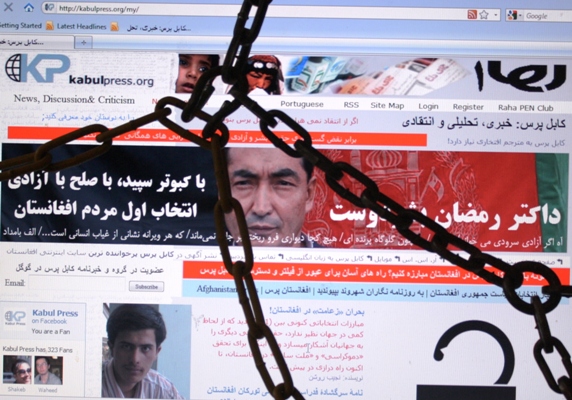
Kabul Press website officially blocked in Afghanistan by Afghan government
Basic democratic right of freedom of speech violated
Reading time: (Number of words: )
Sources in Afghanistan have confirmed that www.kabulpress.org is now being officially filtered by the Afghan Ministry of Communication on Internet connections in Afghanistan. In a recent letter to the Afghan Ministry of Culture, the Communication Ministry was ordered to filter several news and politics websites that were deemed harmful to Afghan culture, and should not be seen by the people of Afghanistan. Kabulpress.org was the primary target of the ban.
Kabulpress.org is one of the most popular news and discussion websites in the Afghan Dari language, averaging nearly 600,000 page views per month. Because Kabulpress targets corruption in the Afghan government, aid agencies working in Afghanistan, and international governments that support the current Afghan government, it has been a thorn in the side of the Karzai administration for several years.
While in Afghanistan, Kabulpress founder, Kamran mir Hazar, was threatened, arrested, and beaten several times by the Afghan Secret Service (NDS) for publishing multiple incriminating documents obtained from sources inside the government. After fleeing Afghanistan Kamran was granted asylum and official protection by the United Nations, and re-located to Europe, where he continues to manage Kabulpress with 1,700 contributors from Afghanistan and around the world.
Kabulpress had been warned by sources in the Afghan government in early June that such filtering was imminent as part of a broad communications bill passed by the Afghan government. However, government representatives insisted that no political or news websites were being considered for filtering. Nevertheless, several weeks ago, Kabulpress began daily publishing of instructions for methods to easily circumvent government filtering. These methods had been perfected by free speech advocates working under repressive regimes in Iran and China.
Mir Hazar says that he is “not too disturbed by the filtering; Kabulpress readers know how to get to us. But filtering Kabulpress does underscore our belief that the Afghan government is not the democracy-loving institution that much of the Western media and leadership think it is. It means that they need to examine more closely the current and past actions of Karzai and his administration, especially regarding basic democratic human rights, if they want a more just and democratic Afghanistan.

Poems for the Hazara
The Anthology of 125 Internationally Recognized Poets From 68 Countries Dedicated to the Hazara
Order Now









